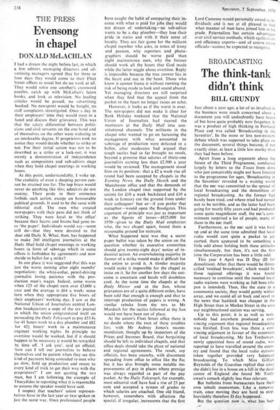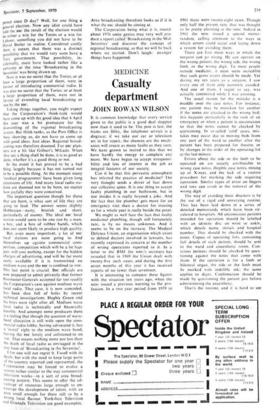BROADCASTING
The think-tank didn't think
BILL GRUNDY
Just about a year ago, a lot of us involved in the business were much concerned about a document you will undoubtedly have heard of but have quite probably now forgotten. It was a product of high thinking in Portland Place and was called 'Broadcasting in the Seventies'. In the more or less non-existent debate which was supposed to take place on the document, several things became, if not exactly clear, at least a little less murky than they had been before.
Apart from a long argument about the future of the Third Programme, conducted largely by letters to the Times from dons who just conceivably might not have listened to the programme for ages, 'Broadcasting in the Seventies' revealed to a waiting world that the BBC was committed to the spread of local broadcasting and the demolition of regional broadcasting. As the former had barely been tried, and where tried had turned out to be terrible, and as the latter had been going for nearly fifty years and had produced some quite magnificent stuff, the atic's com- mitment surprised a lot of people, many of them in the BBC itself.
Furthermore, as the BBC said it was hard up and at the same time admitted that local radio would cost quite a packet to get started, there -appeared to be something a little odd about holding both these attitudes simultaneously, but then, it's not the first time the Corporation has been a little odd.
This year 4 April was D Day (D for demolition). After that there would be things called 'residual broadcasts', which would be those regional offerings it was found necessary to continue until the mooted local radio stations were working at full bore (the pun is intended). Then, like the state in a communist society, they would gently wither away, and we could all sit back and revel in the news -that haddock was cheaper in the High Street than in Market Street in the area our neighbourhood station was serving.
Up to this point, it is as well to note, nobody had anywhere produced a con- vincing argument that regional broadcasting was finished. Even less was there a con- vincing argument in favour of the extension of local broadcasting. Mr Ian Trethowan. newly appointed boss of sound radio, was reported to have travelled around the coun- try and found that the local radio stations taken together provided very balanced broadcasting. To which Miss Gillian Reynolds of the Guardian replied that since she didn't live in a house on a hill in the dead centre of England she found Mr Treth- owan's remark slightly less than relevant.
But bulletins from bureaucrats have their own inbuilt momentum. Like a runaway train, once moving they are hard to stop. Inevitably therefore D day happened.
But the question now is, what has hap- pent d since D day? Well, for one thing a eneral election. Now any idiot could have fold the BBC the result of the election would be either a win for the Tories or a win for Labour, something you did not have to be David Butler to realise. Considered coolly then, it meant that there was a distinct possibility that we would very soon have a Tory government. That possibility, in- cidentally, must have looked rather like a certainty at the time 'Broadcasting in the Seventies' was being drawn up.
Now it was no secret that the Tories, or at least a large proportion of them, were in favour of introducing commercial radio. It was also no secret that the Tories, or at least a large proportion of them, were not in favour of extending local broadcasting as run by the BBC.
Taking things together, you might expect that the Corporation's think-tank would have come up with the good idea that 4 April this year was a bit premature for the dismantling of the ritgional broadcasting system. But think-tanks, as the Post Office is busy showing us, do not have to come up with good ideas. Just ideas. Regional broad- casting was therefore doomed. For BBC plan- ners are a bit like Gilbert's Mikado. When they say a thing shall be done, it is as good as done, whether it's a good thing or not.
In the event it hat proved to be a bad thing, largely because it has not turned out to be a possible thing. At the moment many 'residual programmes' have been given long extensions of life. And many local radio sta- tions are doomed not to be born, no matter how joyfully they were conceived.
The important question though for those that are born, is what sort of life they are going to lead. The answer seems slightly Hobbesian—nasty, brutish and short, particularly of money. The ideal BBC local station would seem to be one run by a man, a boy, and a box of rubber bands, which does not seem likely to produce high quality.
But, even more important, a lot of BBC local stations are soon going to find themselves up against commercial com- petition, competition which will be a lot hap- pier. will cost nothing, except for the hidden charges of advertising, and will be far more easily available if it is transmitted on medium wave and the Bac is confined to VHF. Mk last point is crucial. BBC officials are now prepared to admit privately that former Postmaster-Generals accepted far too readily the Corporation's case against medium wave local radio. That case, it is now conceded, has been shot full of holes by recent technical investigations. Hughie Green and his boys were right after all. Medium wave local radio is technically and financially feasible. And amongst some producers there Is a feeling that though the question of wave- band allocation is still wide open the com- mercial radio lobby, having advocated it. has a 'moral' right to the medium wave band, leaving the BBC lonely and unlistened-to on VHF. That means nothing more nor less than the death of local radio as envisaged in the rosy haze of 'Broadcasting in the Seventies'.
I for one will not regret It. Faced with its death, but with the need to keep large parts of the country reported and represented, the Corporation may be forced to evolve a sYstem rather similar to the way commercial television works—in a sort of area broad- casting pattern. This seems to offer the ad- vantage of resources large enough to en- courage the development of talent, with an area small enough for there still to be a strong local flavour. Yorkshire Television and Granalla Television are good examples. Area broadcasting therefore looks as if it is what the BBC should be aiming at.
The Corporation being what it is, round- about 1976 some genius may very well pro- duce a report called 'Broadcasting in the Mid' Seventies' and discover the concept of regional broadcasting, so that we will be back where we started. Don't laugh : stranger things have happened.































 Previous page
Previous page